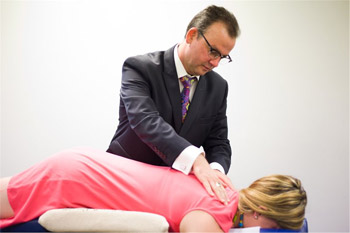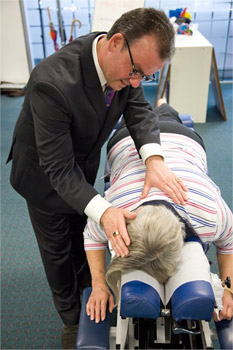Joe Ierano World Spine Day Interview

Joe Ierano World Spine Day Interview
Headache is one of the most common health conditions in Australia, and while many of us think getting one is just a normal part of life, it could be a sign of an underlying issue with the neck and spine.
With just a week until World Spine Day on Wednesday October 16th, Chiropractors have asked us to readjust our thoughts on what could be causing our pain.
It's estimated around 7 million Australians will suffer from a tension headache at some point, and while reaching for pain medication is often second nature – it could be masking the cause, instead of fixing the problem.
President of the Chiropractors Association of Australia (NSW), Chiropractor Dr Joseph Ierano said the link between the spine and tension headaches has been known for over 2 decades.
'Research shows inflamed nerves in the neck can direct pain into the face and cause headaches," Dr Ierano said.
'Slouching while sitting down in front of a computer is one of the most common ways this can happen."
'Nerves at the base of the skull become compressed, which causes inflammation and head pain," he said.
'Another bad habit to watch out for is shoulder and neck tension caused by sleeping on the stomach with your face turned to one side."
Dr Ierano added if neck or back pain is experienced in conjunction with a headache, then it might be time to take a look at your spinal health.
'Most people will pop a pill and hope the pain will go away, but recent studies show this can actually make the pain worse."
'Making an effort to improve posture, or stopping bad habits like clenching your jaw can help reduce the frequency and severity of headaches for some sufferers, but if this doesn't work then it could be worthwhile to seek professional help," Dr Ierano said.
A 2011 study at Macquarie University found over one fifth of 127 people who received chiropractic care over 6 months reported a 90 percent reduction in migraines, while half experienced noticeable improvement.
The Chiropractors' Association of Australia (NSW) has come up with a few techniques you can adopt at home or at the office to help reduce the frequency of headaches:
Be conscious of slouching while in front of the computer or TV.
Try to limit the time spent sitting down, and aim to lead an active lifestyle.
Be mindful of the way you sleep, as sleeping on the stomach can cause shoulder, neck and back tension.
Be aware of poor habits such as clenching the jaw.
Work on proper posture when walking or in a standing position.
Interview with CAANSW President Joe Ierano
Question: What is the correlation between headaches and neck and shoulder problems?
Joe Ierano: The neuro-musculo-skeletal system (nerve, muscle, joints system) is the link. If you like, it links everything soft with everything hard in the body. The blood vessels are all supplied by nerves. These nerves are irritated by neck injuries or spasms. There is a diagnosis called 'cervicogenic headache' and this is where the neck is a known cause of head pain referral. Shoulders and arms get all their nerve supply from the neck also. Herein lays the connection.
 Question: How can we be sure whether our headache is caused by a neck or shoulder problems?
Question: How can we be sure whether our headache is caused by a neck or shoulder problems?
Joe Ierano: With accurate diagnosis training that the chiropractor has. Studies have shown excellence in musculoskeletal diagnosis is superior in chiropractic students and practitioners. Sometimes referral and/or special imaging is required to rule out other nonmusculoskeletal (and more serious) causes.
Question: How can chiropractors help with our neck or shoulder problems?
Joe Ierano: The spine is a continuous mechanism of movement and connected to all other parts of the body. Chiropractors are expertly educated in the diagnosis and management of muscular and skeletal problems in these areas.
Question: Can you talk us through how we should be sitting, at our desks?
Joe Ierano: Check these things:
1. is your head tilted up a little or always looking down on the screen?
3. does your chair have a good back support?
4. have you tried a chair which moves a bit, like a swiss ball, to keep the muscles dynamic?
5. get up and stand at your desk if you can, make it higher
6. if you can stand, just don't sit
7. ever tried using two mice or trackpads or a left and a right input device? It promotes symmetry and brain function
8. do stretches as you sit
9. use wrist gel pads
10. keep your shoulders relaxed by having your elbows at 90 degrees and the keyboard not too high
Question: As most of us spend a lot of time, sitting at a desk; what breaks should we take?
Joe Ierano: At least every 20 minutes, even if its to rotate your head, and check your posture at least every 5 minutes... yes five!
Question: Should we be looking at stretching, throughout the day, in the office?
Joe Ierano: Yes, you can do them seated standing or anywhere without making a spectacle of yourself... even take a run up and down the office stairs for no reason.
Question: What else can we do, throughout the day, to help with our posture, when sitting?
Joe Ierano: Keep a bottle of water at arm's length, because dehydration is bad for backs too!
If you must sit at work, then when you get home watch TV standing for a while... crazy? Maybe, but you just might live longer!
Question: Is it possible to reverse the damage from sitting at a desk, all day?
Joe Ierano: Chiropractors do it daily with our treatments, but there is a limit, and there is a stage where "prevention is always better than cure".
Question: Do fitball chairs work for our posture?
Joe Ierano: Yes, but they roll around. I find this product remarkably good...
Question: What message do you hope to get out to Australians for the coming, World Spine Day?
Joe Ierano: Musculoskeletal injuries are among the most debilitating and costly of all chronic diseases. Posture and movement are key elements in influencing the nervous system and muscular and joint injuries that all amount to health and wellbeing on every level. Chiropractic is the leading neuro-musculoskeletal-based profession for over a century.
Interview by Brooke Hunter
MORE



